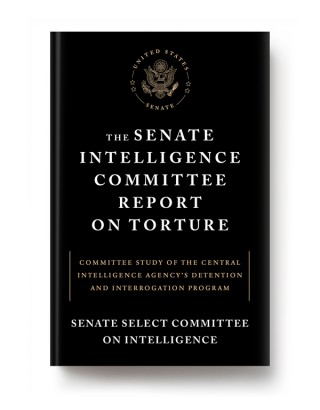July 13, 2015
New report: American Psychological Association colluded with DoD and CIA to promote torture
by Mark Krotov
 The story of psychologists James Mitchell and Bruce Jessen was surely one of the most shocking revelations to emerge from the publication the Senate Intelligence Committee Report on Torture. Known in the report as Grayson Swigert and Hammond Dunbar, Mitchell and Jessen developed the horrific “enhanced interrogation” program used by the Central Intelligence Agency against detainees around the world. In 2005, the CIA paid Mitchell and Jessen $81 million for the facilitation and implementation of torture.
The story of psychologists James Mitchell and Bruce Jessen was surely one of the most shocking revelations to emerge from the publication the Senate Intelligence Committee Report on Torture. Known in the report as Grayson Swigert and Hammond Dunbar, Mitchell and Jessen developed the horrific “enhanced interrogation” program used by the Central Intelligence Agency against detainees around the world. In 2005, the CIA paid Mitchell and Jessen $81 million for the facilitation and implementation of torture.
But the case of Mitchell and Jessen has always been about something more than two rogue psychologists. In May, we noted the release of a report called “All the President’s Psychologists: The American Psychological Association’s Secret Complicity with the White House and US Intelligence Community in Support of the CIA’s ‘Enhanced’ Interrogation Program,” which examined the APA’s collaboration with the Bush Administration.
Now, a new report by a team led by Chicago lawyer David Hoffman, of the law firm Sidley Austin, offers a far more detailed and damning look at the close relationships between the American Psychological Association and officials at the CIA and the Pentagon—and expands our understanding of how Mitchell and Jessen did what they did with such impunity.
Hoffman’s report, which was conducted at the request of the APA’s board, was obtained by the New York Times and released on Saturday. Here’s an excerpt from its executive summary:
Our investigation determined that key APA officials, principally the APA Ethics Director joined and supported at times by other APA officials, colluded with important [Department of Defense] officials to have APA issue loose, high-level ethical guidelines that did not constrain DoD in any greater fashion than existing DoD interrogation guidelines. We concluded that APA’s principal motive in doing so was to align APA and curry favor with DoD. There were two other important motives: to create a good public-relations response, and to keep the growth of psychology unrestrained in this area.
We also found that . . . APA officials engaged in a pattern of secret collaboration with DoD officials to defeat efforts by the APA Council of Representatives to introduce and pass resolutions that would have definitively prohibited psychologists from participating in interrogations at Guantanamo Bay and other U.S. detention centers abroad. The principal APA official involved in these efforts was once again the APA Ethics Director, who effectively formed an undisclosed joint venture with a small number of DoD officials to ensure that APA’s statements and actions fell squarely in line with DoD’s goals and preferences . . .
[W]e did find evidence that during the time that APA officials were colluding with DoD officials to create and maintain loose APA ethics policies that did not significantly constrain DoD, APA officials had strong reasons to suspect that abusive interrogations had occurred. In addition, APA officials intentionally and strategically avoided taking steps to learn information to confirm these suspicions.
The report is 542 pages long and based on over 50,000 documents—“e-mails, electronic files, and hard copy documents, including contemporaneous handwritten notes”—and over 200 interviews. According to the Times, “by focusing on the role of psychologists, Mr. Hoffman’s report provides new details, and can be seen as a companion to the Senate report.”
What will happen now? It’s worth quoting at length from Spencer Ackerman’s piece in the Guardian, which provides some outstanding context:
Sources with knowledge of the report and its consequences, who requested anonymity to discuss the findings before public release, expected a wave of firings and resignations across the leadership of an organization that Hoffman finds used its extensive institutional links to the CIA and US military to facilitate abusive interrogations.
Several officials are likely to be sacked. Already out, a past APA president confirmed to the Guardian, is Stephen Behnke, the APA’s ethics chief and a leading figure in recasting its ethics guidelines in a manner conducive to interrogations that, from the start, relied heavily on psychologists to design and implement techniques like waterboarding . . .
Evidence in the Hoffman report, sources believe, may merit referral to the FBI over potential criminal wrongdoing by the APA involvement in torture. The findings could reopen something human rights groups have urged for years: the potential for prosecutions of people involved in torture. The definition of “collusion” adopted by Hoffman is said to be similar to language used in the federal racketeering statute known as Rico.
If so, however, it would not be American military or intelligence interrogators themselves under investigation, nor the senior officials who devised torture policy in the Bush administration, but the psychologists who enabled them.
Which is to say that over half a year after the publication of the devastating Senate Intelligence Committee Report, we are not any closer to the prosecution of the architects and central perpetrators of torture, which became official policy in the months and years after the attacks on September 11th, 2001.
But even so, the Hoffman report is an extraordinarily important document. In its detailed account of the American Psychological Association’s collaboration with the Defense Department and the CIA, the report casts a new light on the particularly intense form of corruption that defined the Bush years.
Mark Krotov is senior editor at Melville House.